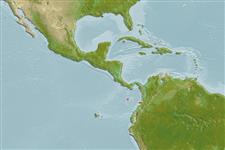Teleostei (teleosts) >
Blenniiformes (Blennies) >
Tripterygiidae (Triplefin blennies) > Tripterygiinae
Etymology: Axoclinus: Greek, axis = axis + Greek, klinein = sloping and bed, due to the four apophyses of sphenoid bone.
Eponymy: Dr Ira Rubinoff (d: 1938) is an American marine biologist who was Director of the Smithsonian Tropical Research Institute in Panama (1973–2007) (now Director Emeritus). [...] (Ref. 128868), visit book page.
Environment: milieu / climate zone / depth range / distribution range
Ecology
Marine; demersal; depth range 1 - 2 m (Ref. 58018). Tropical
Southeast Pacific: Malpelo Island, Colombia.
Size / Weight / Age
Maturity: Lm ? range ? - ? cm
Max length : 3.5 cm TL male/unsexed; (Ref. 11482)
Adults inhabit rocky areas. They feed on tiny invertebrates and algae (Ref. 11482). Eggs are hemispherical and covered with numerous sticky threads that anchor them in the algae on the nesting sites (Ref. 240). Larvae are planktonic which occur primarily in shallow, nearshore waters (Ref. 94114).
Life cycle and mating behavior
Maturity | Reproduction | Spawning | Eggs | Fecundity | Larvae
Allen, G.R. and D.R. Robertson, 1994. Fishes of the tropical eastern Pacific. University of Hawaii Press, Honolulu. 332 p. (Ref. 11482)
IUCN Red List Status (Ref. 130435: Version 2024-2)
Threat to humans
Harmless
Human uses
Tools
Special reports
Download XML
Internet sources
Estimates based on models
Phylogenetic diversity index (Ref.
82804): PD
50 = 0.5156 [Uniqueness, from 0.5 = low to 2.0 = high].
Bayesian length-weight: a=0.00617 (0.00288 - 0.01322), b=3.04 (2.86 - 3.22), in cm total length, based on LWR estimates for this (Sub)family-body shape (Ref.
93245).
Trophic level (Ref.
69278): 2.6 ±0.23 se; based on food items.
Resilience (Ref.
120179): High, minimum population doubling time less than 15 months (Preliminary K or Fecundity.).
Fishing Vulnerability (Ref.
59153): Low vulnerability (10 of 100).
